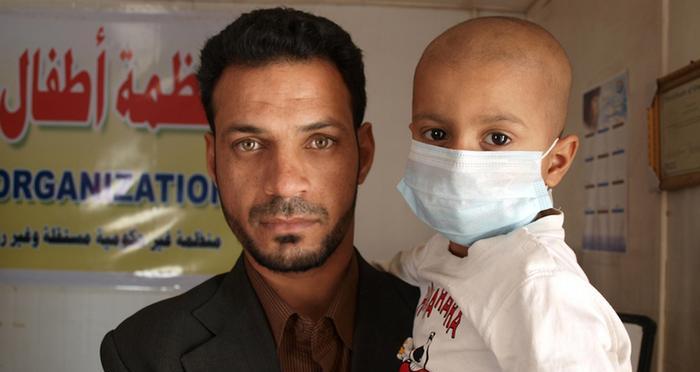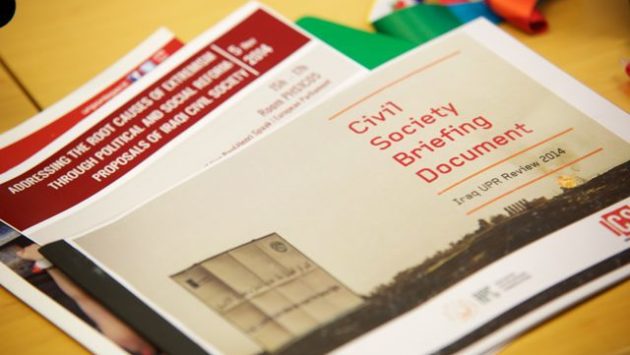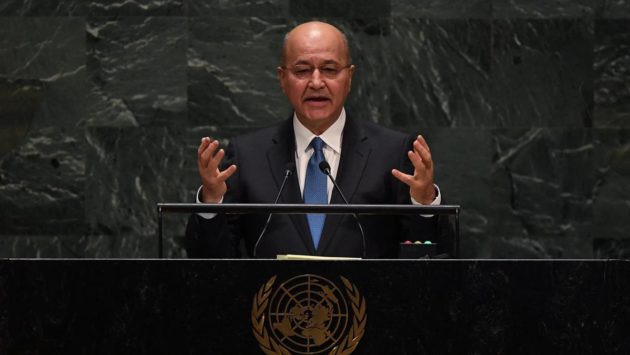The Most Cancerous Street in Iraq? Locals in Basra Leaving Homes Because of Disease!
Niqash | Saleem al-Wazzan | Basra
In the southern city of Zubair, in Basra province, there is one street where the neighbours report more cases of cancer than most. The street is close to former government offices that were bombed by US-led forces in 2003. As a result families have been leaving their homes and appealing to local authorities for action.
There is one street in Zubair, a town in the southern Iraqi state of Basra, that nobody wants to live in. Why? Because there are extremely high rates of cancer among its residents. Residents of Court Street, in the Kut area of Zubair, report 20 incidents of cancer among their neighbours. Eight have already died
“Now people are panicking and some have even left their houses,” the mayor of the Kut area, Mohammed Ghidan Ahmad, told NIQASH.
This is not the first cluster of disease in the province of Basra. In 2012, German news magazine, Der Spiegel, reported on “a study published in September in the Bulletin of Environmental Contamination and Toxicology, a professional journal based in the southwestern German city of Heidelberg” which said that “there was a sevenfold increase in the number of birth defects in Basra between 1994 and 2003. Of 1,000 live births, 23 had birth defects”.
“According to the Heidelberg study, the concentration of lead in the milk teeth of sick children from Basra was almost three times as high as comparable values in areas where there was no fighting,” the magazine said.
Qatar-based news organization, Al Jazeera, has also reported on the issue. “Contamination from Depleted Uranium (DU) munitions and other military-related pollution is suspected of causing a sharp rise in congenital birth defects, cancer cases, and other illnesses throughout much of Iraq,” they wrote.
While there has been no conclusive research into the topic – many of the military organizations suspected of using depleted uranium weaponry say they didn’t use enough to cause the problems Iraq is now having with birth defects and cancers – the residents of Zubair’s Court Street certainly think that the munitions used in the area around their homes are a big part of their problems. The area in which they live is close to headquarters of former Iraqi leader, Saddam Hussein – these were destroyed by the US air force in 2003.
“After a year of the disease, my son Naser, who was six, died of cancer,” says local man Sager Sami Badr. As a result Badr and a group of locals who had also had relatives die of cancer began to appeal to the local government to investigate.
“Most of the incidents of cancer have come from one place and that is close to the buildings previously used by [Saddam Hussein’s] Baath party,” says Mohammed al-Tamimi, the head of Zubair’s local Health and Environment Committee. “These were destroyed by coalition forces in 2003.”
Al-Tamimi said that the health department had cooperated with his own committee to monitor the levels of radiation coming from in and around the former government buildings. Measurements were coming back at between 0.20 to 0.25 microsieverts per hour. This is about the average exposure to radiation for a member of the public from all sources.
These results are neither convincing nor accurate, al-Tamimi says. “We need more advanced equipment and special vehicles that can be used to measure the actual radiation levels,” he argues.
There is also some discrepancy between the information collected by local health authorities and by local environmental authorities. The local council says they identified some dangerous areas but then the Directorate for the Environment said the areas were not dangerous.
“The levels of radiation in this area are within acceptable limits and they don’t affect people’s health,” insists Mustafa Abdullah, who heads Zubair council’s committee on health and the environment. However Abdullah was unable to explain the frequency of cancer cases in certain areas despite normal radiation levels.
It is also possible that it’s not just about radiation. Heavy metal contamination is also a possible culprit, some international researchers have said.
The Basra provincial authorities need to seek foreign assistance with this problem, adds Abbas al-Haidari, the mayor of Zubair district. “We want to warn the federal authorities about the seriousness of this situation and we demand that local patients be sent abroad for treatment if they need it.”




